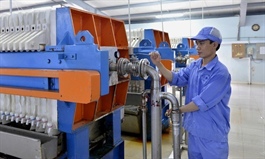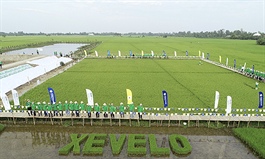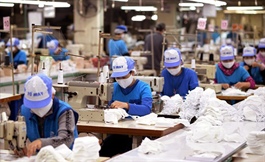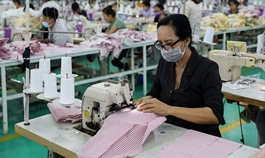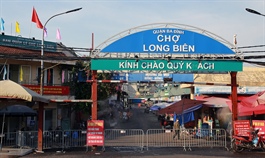Seafood industry urges COVID vaccination soon for its workers as exporters struggle
Seafood industry urges COVID vaccination soon for its workers as exporters struggle
The Viet Nam Association of Seafood Exporters and Producers (VASEP) has written to the Government seeking priority COVID-19 vaccination for workers in the fisheries industry so that it can sustain production and export.

VASEP said more than 70 per cent of enterprises in the industry have had to suspend operations and the remaining too face difficulties in sustaining production while production costs have surged.
According to VASEP, which has 270 members concentrated mainly in the Cuu Long (Mekong) Delta and south-central regions, in view of the worsening pandemic situation most provinces and cities require businesses to have their workers staying on-site or in dormitories or hotels with transportation arranged to the work site.
But only about 30 per cent of seafood enterprises in the southern provinces can meet these conditions, and those that do not, have to stop operations, with consequences such as failing to meet bank and supplier debts, loss of customers and the risk of losing workers post-social distancing, it said.
With factories still in operation, only 30-50 per cent of workers are allowed to work, and the rest are furloughed, it said.
Production capacity is reduced and many orders have to be delayed or cancelled while costs have skyrocketed, including those related to keeping workers on-site, weekly COVID testing costs, paying 30-50 per cent extra wages to workers staying at the factory, paying wages and allowances to workers who have resigned, and a two- to three-fold, even 10-fold increase in marine freight charges, it said.
Besides, enterprises face major difficulties in sourcing inputs for production, it said.
The association said seafood production and exports have reduced significantly since mid-July when 19 provinces and cities in the south imposed social distancing under the Government’s Directive No. 16.
In the first half of July seafood exports grew at 16 per cent, but decreased by 15-20 per cent in the second half, and revenues for the month were down 4 per cent year-on-year at US$763 million, it said.
But thanks to high export growth in the first half of the year, exports for the first seven months were up 11 per cent to $4.88 billion, it said.
But according to VASEP, having workers stay at the workplace is only a temporary measure that can last for two to three weeks and only for medium-sized enterprises. Larger businesses can also maintain it for a maximum of 4-5 weeks since there are too many expenses to be borne.
Truong Dinh Hoe, VASEP’s general secretary, said fighting the epidemic is a top priority, but it is still necessary to maintain production and circulation of essential goods and restore production and export.
“By focusing on vaccinating workers at fisheries processing plants immediately, we will both sustain the export markets and production and jobs for workers, farmers and fishermen."
Binh Duong wants to pilot Nano Covax vaccine
Due to the rapid increase in the number of COVID-19 cases while the number of vaccines is limited, the Binh Duong Province People’s Committee has made an urgent plea to the Ministry of Health to participate in the pilot programme for phase 3 of the Nano Covax vaccine involving 200,000 volunteers, with the volunteers being workers at local enterprises.
The move follows the Binh Duong Business Federation’s proposal to allow it to participate in the third trial phase of the Nano Covax vaccine.
Nano Covax, developed by the Nanogen Pharmaceutical Biotechnology JSC based on recombinant DNA/protein technology, began its first phase of trials in December last year and second phase in February this year.
Phase 3 began in mid-June and is expected to wrap up in August.
Mai Huu Tin, chairman of the federation, said though Nano Covax might not have been licensed for use, he and other members of the federation have faith in the homegrown vaccine’s effectiveness, and so want to participate in the trial.
"Businesses are willing to spend money to vaccinate their employees with the homegrown vaccine. [it] is the best solution to prevent COVID-19.”
Binh Duong is home to 1.2 million workers and currently the country’s second largest COVID hotspot in the country just after HCM City.
The province plans to vaccinate more than 95 per cent of its population over the age of 18, which needs 3.2 million doses of vaccines.
But as of August 2 it has only used 97,000 doses from the Ministry of Health allocation and is currently using another 285,000.







